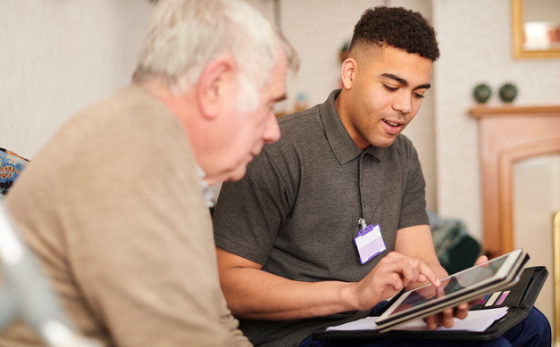
October 24th 2024
Roses Homecare, established in 2007, embarked on its digital transformation journey in 2018. Operating with a staff base of 40-50 carers, the business recognised the limitations of manual processes and the risks associated with outdated systems. By adopting the Birdie platform in 2019, Roses Homecare were able to modernise its operations, enhance service delivery, and improve the quality of care.
Why Roses Homecare went digital
Before going digital, Roses Homecare relied heavily on paper-based systems, which were time-consuming and prone to errors. Carers filled out daily log sheets manually, and these logs were only reviewed once a week when they were submitted to the office. As Ian Stewart, managing director, explains,
“Paper care plans exposed the business to potential risks, such as missed care visits, missed medication doses and inaccurate time tracking. Manually auditing timesheets and medication charts on the weekends was stressful and time consuming.”
These operational challenges spurred Roses Homecare to seek a more efficient and secure way of managing their processes. The key motivation for going digital was to ensure the safety of service users through improved real time call monitoring, medication management, and improve business efficiencies for both carers and the management team.
The benefits of going digital
The introduction of the Birdie platform brought several immediate advantages to Roses Homecare:
- The system enabled real-time access to care logs, ensuring that management could monitor the status of care visits remotely.
- It allowed staff to write detailed, person-centred care plans, ensuring that carers were well-prepared for each visit.
- Medication management was significantly improved—if a carer failed to record medication delivery, they were unable to check out of their visit, preventing missed doses.
- Birdie gives head office the ability to measure performance levels as a collective as well as individually.
Ian explains how it had a bonus benefit during the COVID-19 pandemic,
“Despite reduced office hours during the COVID-19 pandemic, the team were able to manage care delivery effectively and minimise any disruption. Communication between carers and management was made much easier which had a positive impact on service delivery.”
The process to going digital
The transition to the Birdie platform began in November 2019, and by February 2020, the system was fully operational. The onboarding process was smooth, supported by an account manager from Birdie who guided them through each step.
The foundation was set for staff who were introduced to the concept of digitisation in June 2019 and were kept aware of the upcoming changes. While the migration of service user data to the new system was time-consuming, it allowed the team to familiarise themselves with the platform and address any potential concerns in advance.
Challenges and obstacles
Like many companies transitioning to digital, Roses Homecare faced initial hesitations from staff who feared that they would be unable to adapt to the changes of using technology. As Ian elaborates,
“We conducted several training sessions and demonstrations to showcase how the system worked. These practical sessions helped alleviate concerns and demonstrated the platform was a valuable tool, not a surveillance system. It didn’t take long for staff to see the benefits and become more comfortable with using the technology.”
Roses Homecare worked closely with Birdie to tailor the system to meet their needs, such as setting up medication reminders and customising visit time alerts. This flexibility allowed the team to create a system that was both user-friendly and aligned with their operational requirements.
The impact of going digital
Going digital has had a significant impact on Roses Homecare’s service delivery as Ian sums up:
- Real-time logging and alerts through the software mean that carers can manage their visits more effectively and head office can stay up to date with what’s happening out in the field.
- Medication errors are drastically reduced because the system will send reminders and encourages carers to log this information before they leave a visit.
- Communication between the office and carers has been streamlined which has reduced the need for constant follow-up.
- Sharing information with third parties, such as district nurses or clients, is easily achievable and can be done securely through the system.
- Effective performance tool as a service and measures individual performance.